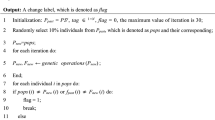Abstract
This paper empirically investigates the behavior of three variants of covariance matrix adaptation evolution strategies (CMA-ES) for dynamic optimization. These three strategies include the elitist (1+1)-CMA-ES, the non-elitist (μ,λ)-CMA-ES and sep-CMA-ES. To better understand the influence of covariance matrix adaptation methods and of the selection methods to the strategies in dynamic environments, we use the state-of-art dynamic optimization benchmark problems to evaluate the performance. We compare these CMA-ES variants with the traditional (1+1)-ES with the one-fifth success rule. Our experimental results show that the simple elitist strategies including the (1+1)-ES and the (1+1)-CMA-ES generally outperform those non-elitist CMA-ES variants on one out of the six dynamic functions. We also investigate the performance when the dynamic environments change with different severity and when the problems are in higher dimensions. The elitist strategies are robust to different severity of dynamic changes, but the performance is worse when the problem dimensions are increased. In high dimensions, the performance of the elitist and the non-elitist versions of CMA-ES are marginally the same.
Access this chapter
Tax calculation will be finalised at checkout
Purchases are for personal use only
Preview
Unable to display preview. Download preview PDF.
Similar content being viewed by others
References
Hansen, N., Ostermeier, A.: Completely derandomized self-adaptation in evolution strategies. Evolutionary Computation 9(2), 159–195 (2001)
Hansen, N., Müller, S.D., Koumoutsakos, P.: Reducing the time complexity of the derandomized evolution strategy with covariance matrix adaptation (cma-es). Evolutionary Computation 11(1), 1–18 (2003)
Ros, R., Hansen, N.: A Simple Modification in CMA-ES Achieving Linear Time and Space Complexity. In: Rudolph, G., Jansen, T., Lucas, S., Poloni, C., Beume, N. (eds.) PPSN 2008. LNCS, vol. 5199, pp. 296–305. Springer, Heidelberg (2008)
Igel, C., Suttorp, T., Hansen, N.: A computational efficient covariance matrix update and a (1+1)-cma for evolution strategies. In: Proceedings of the 8th Annual Conference on Genetic and Evolutionary Computation, GECCO 2006, pp. 453–460 (2006)
Jin, Y., Branke, J.: Evolutionary optimization in uncertain environments-a survey. IEEE Transactions on Evolutionary Computation
Branke, J.: Evolutionary Optimization in Dynamic Environments (2001)
Weicker, K., Weicker, N.: On evolution strategy optimization in dynamic environments. In: Proceedings of the 1999 Congress on Evolutionary Computation, CEC 1999 vol.3., 3 vol. xxxvii+2348 (1999)
Schönemann, L.: Evolution Strategies in Dynamic Environments. In: Yang, S., Ong, Y.S., Jin, Y. (eds.) Evolutionary Computation in Dynamic and Uncertain Environments. SCI, vol. 51, pp. 51–77. Springer, Heidelberg (2007)
Back, T.: On the behavior of evolutionary algorithms in dynamic environments. In: IEEE World Congress on Computational Intelligence, The 1998 IEEE International Conference on Evolutionary Computation Proceedings, pp. 446–451 (May 1998)
Rechenberg, I.: Evolutionsstrategie: Optimierung technischer Systeme nach Prinzipien der biologischen Evolution. PhD thesis, TU Berlin (1971)
Li, C., Yang, S., Nguyen, T.T., Yu, E.L., Yao, X., Jin, Y., Beyer, H.G., Suganthan, P.N.: Benchmark generator for cec 2009 competition on dynamic optimization (2008)
Author information
Authors and Affiliations
Editor information
Editors and Affiliations
Rights and permissions
Copyright information
© 2012 Springer-Verlag Berlin Heidelberg
About this paper
Cite this paper
Au, CK., Leung, HF. (2012). An Empirical Comparison of CMA-ES in Dynamic Environments. In: Coello, C.A.C., Cutello, V., Deb, K., Forrest, S., Nicosia, G., Pavone, M. (eds) Parallel Problem Solving from Nature - PPSN XII. PPSN 2012. Lecture Notes in Computer Science, vol 7491. Springer, Berlin, Heidelberg. https://doi.org/10.1007/978-3-642-32937-1_53
Download citation
DOI: https://doi.org/10.1007/978-3-642-32937-1_53
Publisher Name: Springer, Berlin, Heidelberg
Print ISBN: 978-3-642-32936-4
Online ISBN: 978-3-642-32937-1
eBook Packages: Computer ScienceComputer Science (R0)




